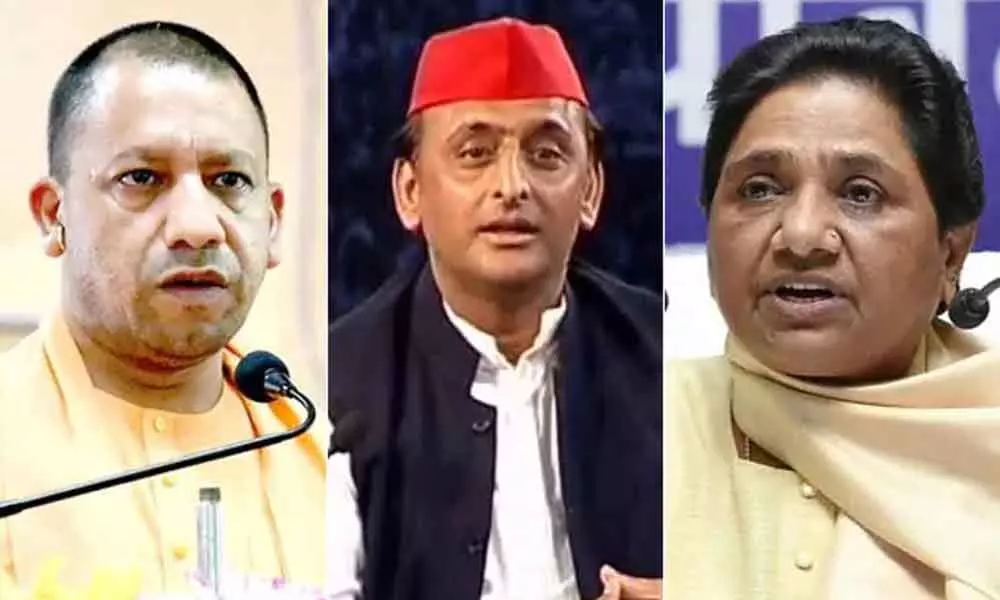Live
- Pakistan Protests: PTI Supporters March Towards Islamabad, Demanding Imran Khan's Release
- Additional Collector Conducts Surprise Visit to Boys' Hostel in Wanaparthy
- Punjab hikes maximum state-agreed price for sugarcane, highest in country
- Centre okays PAN 2.0 project worth Rs 1,435 crore to transform taxpayer registration
- Punjab minister opens development projects of Rs 120 crore in Ludhiana
- Cabinet approves Atal Innovation Mission 2.0 with Rs 2,750 crore outlay
- Centre okays Rs 3,689cr investment for 2 hydro electric projects in Arunachal
- IPL 2025 Auction: 13-year-old Vaibhav Suryavanshi becomes youngest player to be signed in tournament's history
- About 62 lakh foreign tourists arrived in India in 8 months this year: Govt
- IPL 2025 Auction: Gujarat bag Sherfane Rutherford for Rs 2.60 cr; Kolkata grab Manish Pandey for Rs 75 lakh
Just In
Zero Transparency In Uttar Pradesh? No RTI Reports Published In 14 Years, Shows Study


- Report by a voluntary group shows state-wise performance under RTI
- The study finds that Uttar Pradesh never published the annual RTI report
- The only state to comply with the RTI Act since 2005 is Chhattisgarh
Lucknow: Uttar Pradesh has not published a single report mandatory under the Right To Information or RTI Act since the transparency law came into being in 2005. In contrast, Chhattisgarh is the only state which brought out all its yearly reports, a voluntary group said on Friday.
Transparency International India or TII came out with its report on the eve of Right To Information Day or RTI Day, when the transparency regime started in the country on October 12, 2005. The report analyses functioning of 28 state information commissions in the country.
Uttar Pradesh has failed to publish a single RTI report since the RTI Act came into being in 2005. Publishing the annual RTI report is mandatory, the group said.
"Chhattisgarh is the only state which has published (also available on website) annual reports from the years 2005 to 2018. However, only nine out of 28 states (excluding Jammu and Kashmir) have published annual reports up to the year 2017-18. Publishing annual report is mandatory as per RTI Act 2005," Transparency International India said.
Under Section 25 of the RTI Act, it is mandatory for the Central Information Commission and State Information Commissions to prepare a report annually on the implementation of the provisions of the act during that year and forward a copy of it to the appropriate government.
The state transparency report published by Transparency International India states that while Chhattisgarh has strictly complied with the provisions of the law, Uttar Pradesh is the only state which has not published even a single report in the last 14 years.
Representation of women as information commissioners is also dismal in state panels with only seven of them having a woman member each, which is approximately 4.5 per cent of the total sanctioned posts.
An Information Commission is supposed to have 10 Information Commissioners and one Chief Information Commissioner.
The data presented by Transparency International India shows that 24 out of 155 posts of Chief Information Commissioner and Information Commissioners are vacant in the central and state panels. The reports says the number of vacancies have halved since last year.
"Although all states (except Bihar) have a functional website, the websites are only ritualistic except for states like Central Information Commission, Rajasthan and Gujarat, giving basic information and providing no real details about the working of the Information Commissions," the report said.
Among the highly populated states, highest number of complaints and appeals (4.61 lakh) landed at the Information Commission in Tamil Nadu since 2005 when RTI Act came into being, while on the other extreme of spectrum is Telangana which received only 10,619 and West Bengal which received 20,058 cases and complaints during the period, Transparency International India said.
In the states with population less than one crore, state information commission of Himachal Pradesh received 8,549 appeals and complaints since 2005 while Mizoram received just 206 appeals and complaints during the period.
"RTI legislation has been utilised to reorient public policy and it has facilitated the healthy working of democracy. It is a tool to make the governance system transparent and accountable and definitely not a weapon against the government," said Rama Nath Jha, executive director of Transparency International India.
He said it is high time to stand united to fight and reinvent the network of pro-transparency civil society groups of country to intensify struggle for the Right to Information 2.0.

© 2024 Hyderabad Media House Limited/The Hans India. All rights reserved. Powered by hocalwire.com






